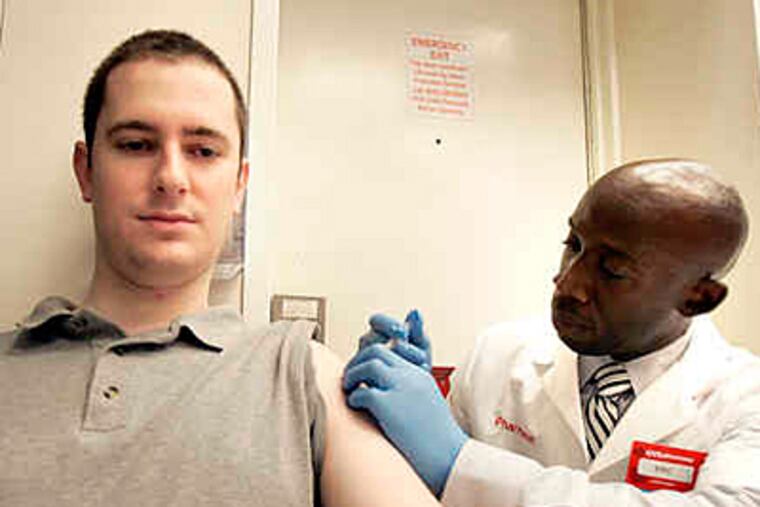Flu is on the rise in the Philly area, but there is still time to get the shot
The number of reported flu cases are on the rise.

Sneezing and coughing over the holidays was probably due not to flu, but to nasty respiratory viruses that have been making the rounds. But confirmed cases of fever-inducing, misery-making flu are on the rise, health officials report.
“All of the sudden in the last two to two-and-a-half weeks, the numbers have just rocketed up,” said Henry Fraimow, an infectious-disease specialist at Cooper University Health Care in Camden. Since Christmas, there have been about 20 to 25 newly diagnosed cases at Cooper alone, said Fraimow.
But those figures are likely a severe undercount, he said, since not all patients with flu get tested.
According to the New Jersey Department of Health, flu activity is high all across the state with a total of 439 laboratory-confirmed cases as of Dec 29.
In Pennsylvania, flu activity is categorized as widespread, and has increased in all regions with the highest rates reported in the southeast and northeast. There have been a total of 6,435 laboratory-confirmed influenza cases, including eight adult deaths from Sept. 30 to Dec. 29, according to the state Health Department.
Of those, 193 cases were reported in Bucks County, 165 cases in Chester County, 143 in Delaware County, and 197 in Philadelphia. Luzerne County had the most reported cases to date with 952.
In Delaware, there have been 461 laboratory-confirmed cases of influenza including three adult deaths as of Dec. 22, the state’s public health department said Wednesday.
In addition, 80 people have been hospitalized with flulike symptoms since the start of the flu season. These numbers are higher than last year at the same time, when there were 225 laboratory-confirmed cases of influenza and 63 hospitalizations, according to the state.
Nationally, the Centers for Disease Control and Prevention has reported an increase in flu activity. There were 11 reported pediatric deaths from flu as of Dec. 22. Adult deaths are not tracked nationally.
The minute Joseph Bushra, an emergency medicine physician at Lankenau Medical Center, hears a patient say they feel as if they have been hit by a Mack truck, "you can be pretty confident they have the flu,” he said.
Since Nov. 1, the Lower Merion Township hospital has seen 32 confirmed flu cases, mostly in the last two weeks, he said. Nine of those patients were admitted to the hospital.
“It is probably a little bit busier than it was last year,” he said.
Flu is not the only seasonal virus making people miserable.
Up to now, the respiratory syncytial virus (RSV) has been keeping pediatricians busy, said Julia Sammons, medical director of infection prevention and control at Children’s Hospital of Philadelphia. But flu activity has increased over the last few weeks, she said.
“As [RSV] goes down, flu activity will start to tick up,” Sammons said. The hospital has started to limit the number of visitors at the hospital to keep flu from spreading to patients, she said.
Flu frequently is most dangerous to the very young, the very old, and those with underlying health conditions that make them more vulnerable. But it can spell days of misery even for an otherwise healthy person. Getting the shot is not a guarantee against getting the flu, but experts say that even if a vaccinated person does get the flu, the symptoms will likely be less severe.
Every year, the vaccine changes to keep up with the flu strains expected to dominate. This year’s vaccine looks to be a good match for the flu strains — mostly the H1N1 strain of Influenza A — that are showing up in emergency departments, Fraimow said.
“Everything we are seeing is in the vaccine,” Fraimow said. Last year was a particularly bad year for flu, and the dominant strains didn’t match the vaccine, he said.
There have been two high-profile flu deaths recently.
Conservative writer and TV commentator Bre Payton, 26, died Dec. 28 after being diagnosed with the H1N1 virus and meningitis. Additionally, the 8-year-old Guatemalan child who died on Christmas Eve in the custody of U.S. Customs and Border Protection was reported to have Influenza B.
If you think you have the flu, stay home, cover your mouth when you cough, drink plenty of fluids, and rest, doctors advise. Prescription antiviral medications such as Tamiflu and Xofluza, the first new influenza drug in 20 years, may help shorten the symptoms of flu if you start them quickly enough. Antibiotics will not help with influenza.
Though it takes a couple of weeks for the flu vaccine to become fully effective, “there is still benefit to getting your flu shots now,” said Fraimow. Flu season could last at least two more months, he said.
Over the holidays, people on vacation were passing the virus on to friends and relatives but not to work colleagues or classmates, Fraimow said. Now that everyone is back from their holidays, there will be an uptick in absenteeism.
“It will spread,” he said.